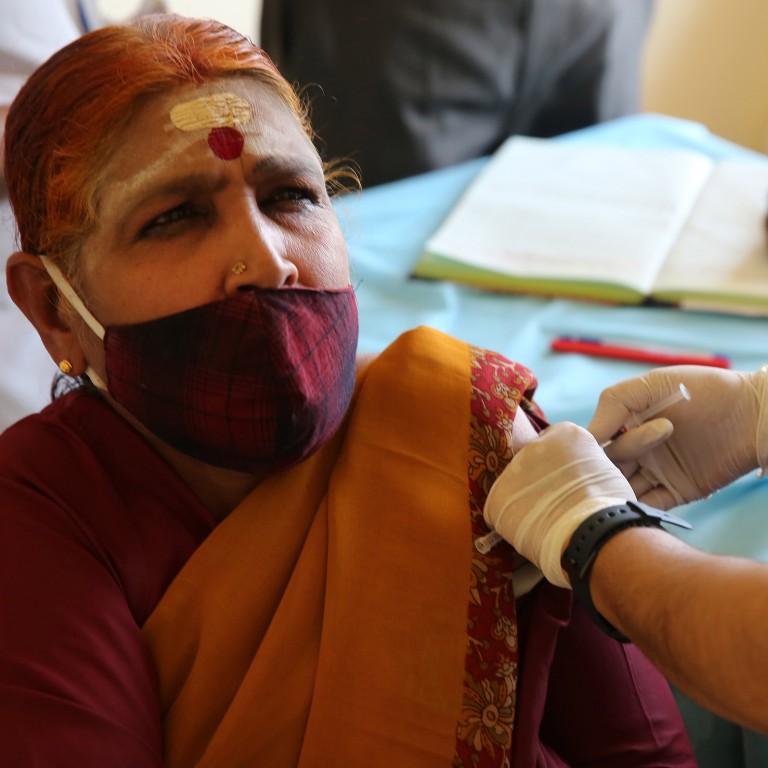
India’s Bharat Biotech says its Covaxin coronavirus vaccine is 81 per cent effective
- Concerns were raised when the domestically developed vaccine was rolled out for emergency use in January before Phase 3 trials were completed
- Elsewhere, Cambodia’s PM Hun Sen has received a shot of the AstraZeneca Covid-19 vaccine supplied by the UN-backed Covax Facility
Questions had been raised by Indian medical experts about the effectiveness of Bharat Biotech’s Covaxin vaccine after officials authorised it for emergency use in January even though its Phase 3 trials – the last stage before regulatory approval – were not complete.
“Covaxin [not only] demonstrates high clinical efficacy trend against Covid-19 but also significant immunogenicity against the rapidly emerging variants,” Bharat Biotech chairman Krishna Ella said in a statement on Wednesday.
The company added that “severe, serious, and medically attended adverse events occurred at low levels and were balanced between vaccine and placebo groups”.
India’s PM Modi gets coronavirus vaccine as cases spike
It said interim phase 3 trial results for Covaxin – co-developed with the scientific agency leading the government’s response, the Indian Council for Medical Research – were based on 43 cases of Covid-19 among 25,800 participants.
Of the 43 cases, 36 were recorded in participants who received a placebo and seven in those who were given Covaxin, pointing to an efficacy rate of 80.6 per cent after two doses for those who had not previously been infected by the virus, the company added.
The firm said it would share further interim analysis after 87 cases, with a final analysis planned for 130 cases.
The data from the second and final studies would also be submitted to a peer-reviewed journal for publication, it added.
Covaxin, alongside the AstraZeneca/Oxford shot, is one of two vaccines approved for use in India. The AstraZeneca/Oxford vaccine has been found to be about 62 per cent effective in preventing infection while the Pfizer-BioNTech and Moderna vaccines were found to be more than 90 per cent effective.
In Modi’s India, political row erupts over home-grown coronavirus vaccine
Fears about the lack of efficacy data for Covaxin as India’s mass vaccination drive kicked off in mid-January saw some medical workers, including doctors, refuse to get the jab. Activists had also accused the firm of cutting corners and breaching rules in conducting trials in India.
The country has the world’s second-highest caseload with more than 11.1 million infections. The daily increase in cases has fallen sharply this year after peaking in September, although some regions have seen an uptick in infections in recent weeks.
China increases vaccine contribution to Philippines
President Rodrigo Duterte on Thursday said China would provide a further 400,000 doses of Covid-19 vaccine, increasing its total contribution to 1 million shots.
The Philippines has already received its first shipment of vaccines from China, courtesy of 600,000 doses from Chinese drugmaker Sinovac Biotech.
“I will be receiving another [batch], March,” Duterte said on Thursday. “China would give us another 400 [thousand shots], making their donation to this country 1 million.”
The Philippines also on Thursday received more than 487,000 vaccine doses from Britain’s AstraZeneca, the second shipment to the country.
“For those of you who’d opt to take that vaccine, fine with me... Others might prefer brands,” Duterte said. “The doctors are very discriminating. They’re waiting for Pfizer.”
Cambodia’s PM receives vaccine
They were among the first in Cambodia to receive the AstraZeneca Covid-19 vaccination, manufactured by the Serum Institute of India, at Phnom Penh’s Calmette Hospital.
The jabs were among a batch of 324,000 AstraZeneca doses that arrived in Cambodia on Tuesday as part of the Covax Facility programme.
Covax Facility is an initiative by the Vaccine Alliance (Gavi), the Coalition for Epidemic Preparedness Innovations, and the World Health Organization to help developing countries access Covid-19 treatments. It is set to supply enough doses to inoculate some 20 per cent of Cambodia’s population of 15.5 million.
Outbreak in Cambodia’s Chinese community prompts official warning
Cambodia began its coronavirus vaccine roll-out in February with the first batch of 1 million Sinopharm vaccine doses donated by Beijing.
Cambodia has approved for emergency use three Covid-19 vaccines: two from Chinese companies Sinopharm and Sinovac, and another from AstraZeneca developed with the University of Oxford. The 68-year-old prime minister was unable to receive the Sinopharm vaccine because it is currently restricted for use on people aged between 18 and 59.
After months of largely avoiding community spread of Covid-19, Cambodia is experiencing its worst outbreak since the pandemic. The current cluster is responsible for some 400 of the country’s 909 overall cases.
Additional reporting by DPA

.png?itok=arIb17P0)